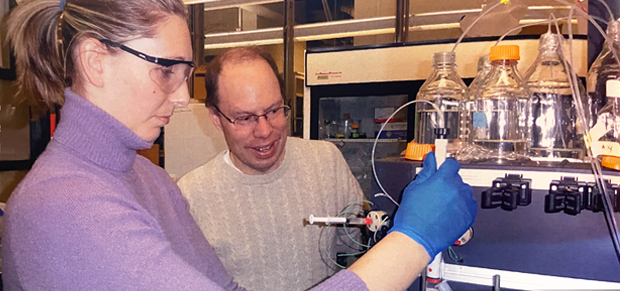Partners against disease
U of M researchers share in $3 million grant to develop an anti-fungal drug
By Tim Montgomery and Amy Leslie
 Researchers from the College of Biological Science's BioTechnology Institute (BTI) and from the College of Pharmacy's Institute for Therapeutics Discovery and Development (ITDD), in partnership with the Arizona-based company Valley Fever Solutions Inc. and the University of Arizona, have been awarded a $3 million grant from the National Institutes of Health to develop and study the use of nikkomycin Z (NikZ) as a potential curative therapy for Valley Fever.
Researchers from the College of Biological Science's BioTechnology Institute (BTI) and from the College of Pharmacy's Institute for Therapeutics Discovery and Development (ITDD), in partnership with the Arizona-based company Valley Fever Solutions Inc. and the University of Arizona, have been awarded a $3 million grant from the National Institutes of Health to develop and study the use of nikkomycin Z (NikZ) as a potential curative therapy for Valley Fever.
Valley Fever, or coccidiomycosis, is a fungal infection that can cause fever, chest pain and coughing, and can typically last for weeks to months. It's endemic to the southwestern United States, with an estimated 50,000 to 100,000 persons developing symptoms each year - 35,000 in California alone. Some patients suffer long-term disabilities that require extensive medical treatment. At particular risk are immunosuprressed patients, including those with AIDS or recipients of organ transplants, African-Americans, Asians, pregnant women and the elderly.
Researchers at the University of Arizona initially approached the BTI in 2008 for assistance in developing a production process for NikZ to facilitate clinical testing.
"Recent advances in genetic modification of the NikZ strain made by our collaborators at the University of Arizona allowed the deletion of an inactive metabolite called nikkomycin X," said Dr. Marc von Keitz, principal investigator on the grant and director of BTI's Biotechnology Resource Center. "By eliminating nikkomycin X, fewer steps are needed and more of the NikZ is recovered in the purification process, thus reducing the overall cost of the drug."
Manufacturing the material for clinical trials will be an inaugural project for a new collaborative effort between the BTI and the ITDD. The collaboration is aimed at producing new drugs from protein-based and natural product-based materials that meet government standards for clinical testing. The collaboration's production capabilities benefit from BTI's long-established Biotechnology Resource Center and ITDD's Biotherapeutic Protein Production Facility (BPPF), a new resource created by a grant from the Minnesota Partnership for Biotechnology and Medical Genomics as a joint effort of the University of Minnesota and Mayo Clinic.
"The collaboration between BTI and ITDD allowed us to successfully compete for this grant. Our goal now is to simplify scale-up of the NikZ manufacturing process and make this drug more readily available to improve the therapy for people with Valley Fever," said Dr. Vadim Gurvich, associate director of the ITDD and the other PI on the grant.
